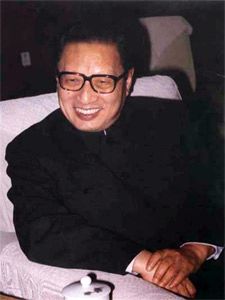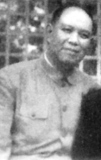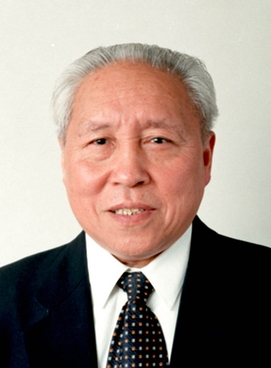| |||||
| Decades: | |||||
|---|---|---|---|---|---|
| See also: | Other events of 1989 History of China • Timeline • Years | ||||
Events in the year 1989 in the People's Republic of China .
| |||||
| Decades: | |||||
|---|---|---|---|---|---|
| See also: | Other events of 1989 History of China • Timeline • Years | ||||
Events in the year 1989 in the People's Republic of China .

The Politburo Standing Committee (PSC), officially the Standing Committee of the Political Bureau of the Central Committee of the Communist Party of China, is a committee consisting of the top leadership of the Chinese Communist Party (CCP). Historically it has been composed of five to eleven members, and currently has seven members. Its officially mandated purpose is to conduct policy discussions and make decisions on major issues when the Politburo, a larger decision-making body, is not in session. According to the party's constitution, the General Secretary of the Central Committee must also be a member of the Politburo Standing Committee.

The Princelings, also translated as the Party's Crown Princes, are the descendants of prominent and influential senior communist officials in the People's Republic of China. It is an informal, and often derogatory, categorization to signify those believed to be benefiting from nepotism and cronyism, by analogy with crown princes in hereditary monarchies. Many of its members hold high-level political and business positions in the upper echelons of power.
The orders of precedence in China is the ranking of political leaders in China for the purposes of event protocol and to arrange the ordering of names in official news bulletins, both written and televised. It is also sometimes used to assess perceived level of political power. Although there is no formally published ranking, there is usually an established convention and protocol, and the relative positions of Chinese political figures can usually be deduced from the order in meetings and especially by the time and order in which figures are covered by the official media. Since 1982, the General Secretary of the Chinese Communist Party has been the highest ranking official in the People's Republic of China (PRC).

Yang Shangkun was a Chinese Communist military and political leader, president of the People's Republic of China from 1988 to 1993, and one of the Eight Elders that dominated the party after the death of Mao Zedong.
Generations of Chinese leadership is a term historians use to characterize distinct periods of the leadership of the Chinese Communist Party (CCP) and, by extension, successive changes in the ideology of the CCP. Historians have studied various periods in the development of the government of the People's Republic of China (PRC) by reference to these "generations".

Li Xiannian was a Chinese Communist military and political leader, president of the People's Republic of China from 1983 to 1988 under paramount leader Deng Xiaoping and then chairman of the Chinese People's Political Consultative Conference from 1988 until his death. He was a full member of the Politburo from 1956 to 1987, and of its Standing Committee from 1977 to 1987.

Wan Li was a Chinese Communist revolutionary and politician. During a long administrative career in the People's Republic of China, he served successively as Vice Premier, Chairman of the Standing Committee of the National People's Congress (NPC), and a member of the Chinese Communist Party (CCP) Secretariat and its Politburo. Wan joined the Chinese Communist Party in 1936 and led revolutionary and wartime resistance activities in his native Shandong province. After the founding of the communist state in 1949, Wan served in a series of government ministries, then worked as a member of the municipal leadership in Beijing. He was purged during the Cultural Revolution, but was eventually rehabilitated and returned to work as party chief of Anhui province, where he led the implementation of successful agrarian reforms centered on the household-responsibility system. In the 1980s, Wan became one of the leading moderate reformers in China's top leadership, advocating for constitutional reforms, the strengthening of legislative institutions, and the abolition of 'lifelong-terms' of top political leaders. He was named head of the national legislature in 1988. He retired in 1993.

Song Renqiong, born Song Yunqin, was a general in the People's Liberation Army of the People's Republic of China (PRC) and one of the Eight Elders of the Chinese Communist Party.
Chen Xitong was a member of the Politburo of the Chinese Communist Party and the Mayor of Beijing until he was removed from office on charges of corruption in 1995.

Qiao Shi was a Chinese politician and one of the top leaders of the Chinese Communist Party (CCP). He was a member of the party's top decision-making body, the Politburo Standing Committee, from 1987 to 1997. He was a contender for the paramount leadership of China, but lost out to his political rival Jiang Zemin, who assumed the post of General Secretary of the party in 1989. Qiao Shi instead served as Chairman of the National People's Congress, then the third-ranked political position, from 1993 until his retirement in 1998. Compared with his peers, including Jiang Zemin, Qiao Shi adopted a more liberal stance in political and economic policy, promoting the rule of law and market-oriented reform of state-owned enterprises.
The 13th Central Committee of the Chinese Communist Party was in session from 1987 to 1992. It held seven plenary sessions. It was preceded by the 12th Central Committee and succeeded by the 14th Central Committee. It elected the 13th Politburo of the Chinese Communist Party in 1987.
The 12th Central Committee of the Chinese Communist Party was in session from September 1982 to November 1987. It held seven plenary sessions. It was succeeded by the 13th Central Committee. It elected the 12th Politburo of the Chinese Communist Party in 1982.

Yao Yilin was a Vice Premier of the People's Republic of China from 1979 to 1988, and the country's First Vice Premier from 1988 to 1993.

Yang Rudai was a politician of the People's Republic of China (PRC). He served as the Communist Party Chief of Sichuan, then China's most populous province, and was the first native Sichuanese to become the top leader of the province since the founding of the PRC. He was a member of the 13th Politburo of the Chinese Communist Party, the top governing body of China. Yang was considered a protégé of the purged reformist leader Zhao Ziyang.
The following lists events from 1992 in China.

Deng Liqun was a Chinese politician and theorist who was one of the leading figures of the Chinese Communist Party (CCP) during the 1980s, most well known for his involvement with the party's propaganda work. Deng was born in Guidong County, Hunan province, and joined the CCP in 1936. He came from an intellectual family and joined the party out of intellectual commitment. He was often referred to as "Little Deng", to be distinguished from Deng Xiaoping, the "Old Deng".
The following lists events in the year 1988 in China.

The president of the People's Republic of China, commonly called the president of China, is the state representative of the People's Republic of China, which on its own is a ceremonial office and has no real power in China's political system. However, since 1993, the post has been held by the general secretary of the Chinese Communist Party (CCP) and chairman of the Central Military Commission, who is China's de facto leader.
The following lists events in the year 1990 in China.
The following lists events in the year 1986 in China.